I DON’T LIKE ROCK ‘N’ ROLL
The Hollywood Palladium on Sunset Boulevard . . . I used to bump into Larry there. He always considered himself second-string to Guy Lombardo. Lawrence Welk – I miss him.
I detest rock music. The Beatles’ “Yesterday” is good, and so are a couple tunes by Billy Joel. That’s it. I miss Guy and Larry. And don’t get me started on hip-hop.
I play clarinet. Are you familiar with clarinet? Nobody plays it anymore. A friend of mine — a music teacher — tells kids not to play clarinet. There are no clarinet heroes to look up to these days, and the axe is too hard. There used to be Pete Fountain, but that was 50 years ago. It’s a dead axe.
I like the woody middle register of the clarinet — you can’t beat it. The clarinet talks, and it says “This ain’t rock ‘n’ roll!”
Klezmer? What about it? Klezmer had a moment. Maybe it’ll come back. In the meantime I play standards at nursing homes, and not just in Cleveland. I’ve played the Century Village circuit in Florida. What does an 80- year-old man smell like? Depends.
I talk to my audience before I play, like “How about those Guardians?” Sports talk. I played with Goodman at the Music Hall in Cleveland. Benny and I traded eights. Wait, I’m imaging that.
Rock ‘n’ roll came. And I went. I barely survived. Luckily I got gigs on the cruise ships. Google “Bert Stratton.” I’m a favorite on the Princess Line. I love the fun on the ships. Everybody forgets their troubles. I’ve been all over the world.
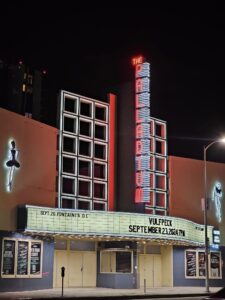 Have you ever been to the Hollywood Palladium? I have. Have you been to any ballroom? Are you familiar with the Aragon in Cleveland? I’m not talking about the Agora, the rock club. I had steady work. Then the money dried up . . . crazy rock ‘n’ roll.
Have you ever been to the Hollywood Palladium? I have. Have you been to any ballroom? Are you familiar with the Aragon in Cleveland? I’m not talking about the Agora, the rock club. I had steady work. Then the money dried up . . . crazy rock ‘n’ roll.
I have friends visiting Cleveland soon. Old chums. Stipulation: no tour of the Rock Hall. We don’t want to see kooks’ costumes.
I once bumped into Lawrence Welk in Detroit. He had just signed with Dodge for a TV show. He was jumpy. He said, “Guy had a TV show and it was a flop. I don’t know.”
I like Larry. My grandkids don’t know from Lawrence Welk. My kids don’t know either.
One more thing . . . And this is crazy. I met Al Jolson. He told me I need to talk to the audience before I blow a single note. “Say something!” Jolson said “Then you’re on first base. The audience is relaxed, thinking ‘he’s a nice guy.’” Jolie also told me to add humor to my shows. He said I could hem and haw all I want — stumble around verbally. Just communicate. “People don’t want robots,” Jolie said.
I have fans. Jack Saul (a record collector in Cleveland), for instance. He loves my work. Unfortunately he’s dead. A lot of my fans are dead. They count, particularly if they don’t like rock ‘n’ roll.
—
fiction. (Thirty-three percent of this is stolen from Irving Fields’ as-told-to autobio, The Pianos I Have Known.)
October 2, 2024 6 Comments
FALL GUY
I was putting away my tenor sax. I was seated. The wooden chair leg snapped and I fell into a bunch of flower bouquets stage-side. Wet flowers. Luckily I had on a heavy tux jacket. I landed on my shoulder. I wore the heavy tux because it was cold out (earlier this month); the wedding gig was in a tent with no heat. Good news. I didn’t injured anything.
When an old person tumbles, it’s newsworthy, at least to the tumbler. I see falls occasionally on gigs – old people doing the hora and tripping. Once a young woman tripped and broke her ankle. She was scheduled to run a marathon. It’s all about the shoes.

Seven steps in Michigan. (Camp Michigania)
Seven steps in Michigan . . . I was walking down some steps in Michigan last month. The stairs were outside, it was dark and everybody was saying “Look at the blue moon — the super moon!” I did, and I went flying. I had just seen the Olympics on TV; maybe that’s why, in mid-air, I decided to “plant” like a gymnast and then roll on my right shoulder. I had on a polar fleece jacket. Again, nothing happened. 2-for-2.
A friend sprained her ankle hiking in Colorado on vacation. An acquaintance broke her hip in Cuba on a trip (literally); she wound up staying down there a couple extra weeks. In Mexico I fell off a mountain bike and injured my ribs. That was five years ago. I’d like to blank that out. I bruised my ribs. Not broken, not fractured, just bruised. At least I think I was just bruised; I never got an X-ray to find out. I could breathe. It was a little difficult to play the clarinet but I could.
Roll with it. Hope your luck holds.
—
Yiddishe Cup plays the University Heights Fall Fest 12-1 pm this Sunday (Aug. 29) at Walter Stinson Park, 2301 Fenwick Rd, University Heights, Ohio. The event is free.
September 25, 2024 1 Comment
THE STOMACH JEW
English novelist Howard Jacobson described himself as a “stomach Jew” in an interview. He’s a bagel-and lox guy. He doesn’t go to synagogue. He’s a stomach Jew. How about a lung Jew? A vein Jew?
I bumped into Jacobson in London. Former Yidd-Cupper Irwin Weinberger and I ran into him on the street. Irwin and I were over in Londres in 2016. Irwin feigned a British accent while we busked. We did “When I’m 64.” Nothing much happened when we played it. London is big; people ignore you.

Howard Jacobson
I recognized Jacobson’s punim from his book dust- jacket head shots. He won the Booker Prize in 2010. I said to him, “Are you the English Philip Roth?” I couldn’t remember his actual name when I bumped into him. Jacobson acknowledged he was, in fact, the English Philip Roth. Some American book reviewers call him that.
Irwin and I told him we play klezmer and some Catskill’s comedy tunes, and Jacobson said, “Like ‘Bar Mitzvah Ranch?’” (Mickey Katz used to dress up as a Bar Mitzvah rancher in cowboy boots and chaps.) Katz, the musician, was from Cleveland. Jacobson said, “You play for ranchers?” Ohio is ranches.
Goodbye. Jacobson had places to go. A half hour later we ran into him again. What are the chances of that in London? He was with his wife. I should have asked about the “stomach Jew” quote. In America we say “deli Jew.” My dad, Toby, was the king of deli Jews — borscht, halvah, corned beef. He grew up in a deli.
I was once a bagel Jew. I’d go to Bialy’s in University Heights, buy 15 bagels, eat two bagels right away, and drive to my mother’s and give her three, and take home 10. I was more than a bagel Jew. I was a bagel. Next time I run into Jacobson we’ll talk bagels.
September 18, 2024 1 Comment
STAMPS ARE OUT
Some of my friends and relatives are extremely cheap. I know two people who reuse dental floss. I’m not like that, but the one thing I do like to save money on is postage stamps. I won’t use two first-class stamps on a two-ounce letter. I go with one first-class, 73-cent ‘forever’ stamp, plus one “additional-ounce” forever stamp, 24 cents.
I’m a former philatelist. I have a U.N. souvenir sheet from 1965. United Nations stamps were a hot item back then. I got the souvenir sheet as a gift for my Confirmation. It cost my parents $75 ($749 in today’s dollars). The sheet is worthless now. U.N. stamps tanked just like the org.
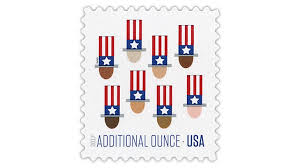 I made a trip to the P.O. to buy “additional ounce” stamps. Also, I decided to get some extra 2-centers, too. Yes, I use Quickbooks and Venmo, but I use the USPS as well. The P.O. clerk handed me the 2-centers and informed me she had no “additional ounce” stamps.
I made a trip to the P.O. to buy “additional ounce” stamps. Also, I decided to get some extra 2-centers, too. Yes, I use Quickbooks and Venmo, but I use the USPS as well. The P.O. clerk handed me the 2-centers and informed me she had no “additional ounce” stamps.
“Do you sell milk?” I said. “This is a post office. You sell stamps! You don’t have stamps? Where can I get the stamps?”
She said try another branch.
I left. I’m not doing any more runs to the P.O. for “additional ounce” stamps. I’ll simply put two first-class stamps on two-ounce mail from now on. So it’ll cost me an extra 49 cents each time. (Maybe my son Ted will get me some additional-ounce stamps if he reads this.) I’ll be spending about $10 more per year by not using the additional-ounce stamp.
—
By the way, I didn’t say “Do you sell milk?” at the P.O. I dreamt that retort up in the P.O. parking lot, post-visit. But the dialogue looks good here, in writing, so pretend I said it.
September 11, 2024 3 Comments
I’M THROWING OUT THESE BOOKS
Every two years I prune my library. My wife insists. If you want any of these books (see list below), stop by my tree lawn before Tuesday — garbage day.

Glenn E. Schembechler
Bowl Game Disasters by Glenn E. Schembechler
Stupid Bastard: The Life of Harry Purim by Meier Meier
10 Days to a Hairless Body by Anne Greune
The Whim of Grit by Malcolm Bolivia
So You Want to Be Jewish? by Miriam Roth
The Story of the Harlem Cooperative Bakery by Rose Lee Pak
Cover Your Lawn with Green Sheet Metal by Jennifer Budzowski
Throw Away Your Truss by Jon Kades
So You Want to Dance, Act, and Play the Clarinet! by Pippi
Kreplach in the Congo by Reb Yellen
Amusing Car Sales by Sid Halpern
Spelling Made EZ by Jaimi Michalczyk
The Peacock Invasion by Morry Corriendo
Good Riddance, Chancres! by Rodney Benton
Cryptic Tokens of Praise (poetry) by Del Spitzer
Whoring in Milan, Rome and Naples by “Lilly”
Goldwater by William E. Miller
The Streets of San Francisco and Richmond, California by Cindy L. Barbour
The Man: Susan B. Anthony by Janice Kugelman-Sugerman
Milk Will Kill You by Len Saltzberg, M.D.
Pet Insurance for Dummies by Buster
Guess Your Friends’ Net Worth by James Kirston
Barbados: Our Key Ally by Cecil Hernandez
Thinking is the New Smoking by Amos The Bison
No Mo’ Boca: A Baby Boomer’s Guide to Retirement by Esther Palevsky
Cuckoos and Grosbeaks by Nancy Dubick
Carolina: The New Promised Land by Irv Weinberg
Visceral Robotics by Suellen Montague
Garbage: A History of Waste Management Inc. by Lake Koonce-Katz
September 4, 2024 5 Comments
EGO
A musician told me he did 200 gigs a year. Impressive. He mentioned they were all nursing-home gigs. Not impressive. (I brag about my nursing home gigs but he can’t.)
The writer Donald Hall told me how much money he made for articles in the The New Yorker and Playboy. He had an audience.
Yiddishe Cup has an audience sometimes, sometimes not. Yiddishe Cup played for 30 people in Grand Rapids, Michigan. That was a long drive. (We’re playing tonight. Details below. A short drive — Pepper Pipes, Ohio.)
A neighbor recently asked my wife and me if we were available for dinner. No, Yiddishe Cup was going on a road trip; the band was flying to Lake Geneva, Wisconsin, for a wedding, then flying to Columbus the next day for a party, and driving home to Cleveland for something — probably a nursing home gig. The neighbor texted Alice and me: “Ahh, the Yiddishe Cup World Tour 2024! How could I forget? Keep on rocking!”
Musicians whine about “World Tour” road-trip trials and tribulations. And you think, “I’d like to do that — go on a tour. Shut up.”
Our recent Yiddishe Cup road-trip weekend was intense — and rare.
A woman asked me, “Does Yiddish Cup still exist?” She had been checking out our Yiddishe Cup website, which hasn’t been updated in years. Maybe I should update it.
—
. . . My cousin Howard Golden just updated the site. Here’s the new home page:

Is that legible? Probably not. Here’s what it says:
“This website is way out-of-date. We don’t need your business. That said, we want your business!
“Some readers — after checking out this historic website — ask, ‘Does Yiddishe Cup still exist?’
“Yes, Yiddishe Cup exists. In 2023 and 2024, Yiddishe Cup played weddings in Temecula, California; Washington, D.C.; Hillsdale, New York; and Lake Geneva, Wisconsin. And of course, we played in Ohio, at concerts, weddings, b’nai mitzvot and community celebrations.”
—
Yiddishe Cup plays tonight (Wed. Aug 28) at 7 p.m. at the outdoor, covered Wain Pavilion on the grounds of Park Synagogue, 27500 Shaker Blvd., Pepper Pipes, Ohio. There are chairs. The concert is free. And if you want, you can donate to Magen David Adom (the Israel Red Cross) at the show.
August 28, 2024 2 Comments
CONCERT FOR ISRAEL
There are three types of Jews. No, not Reform, Conservative and Orthodox. Try American, Israeli and victims of the Holocaust. Each about a third.
The Israeli contingent is top of mind right now, with Iran and its proxies wanting to turn Israel into dead Jews. In America — in Cleveland — what is a Jew to do? I called my friend Shelly Gordon, who moved to Israel after college to become a tennis pro. He played for Ohio State. He still gripes about my childhood private lessons; I violated the South Euclid Tennis Court Oath, which was Don’t Be a Tennis Snob. Shelly‘s strokes are bad but he’s good. He never took a private lesson.
He said, “Ninety percent of Israel is business as usual — going about our lives. I play tennis.” Shelly is a sports nut. He follows the Browns, Buckeye, Cavs and Guardians. In Israel he logs on at 3 a.m. to catch Cleveland sports scores. He once had a yarmulke that read “Cleveland Cavaliers.” On his off days, he visits his children and grandchildren and hopes they don’t get killed.
What‘s a Cleveland Jew to do? Here’s an option. Yiddishe Cup plays a benefit concert for Magen David Adom — the Israeli emergency blood and medical services operation.
The concert is 7 p.m. Wednesday, Aug. 28, at the outdoor, covered Wain Pavilion, Park Synagogue, 27500 Shaker Blvd, Pepper Pike, Ohio.
Magen David Adom is like an Israeli Red Cross. The concert is free but donations are encouraged. Money from the concert — along with gelt from other Cleveland-area contributors — will go toward buying an ambulance.
Yiddishe Cup will play songs from Holocaust-haunted Eastern Europe, America, and songs from Holocaust-avoiding Israel.
Cleveland stands (and sits) with Israel. There are chairs.

August 21, 2024 2 Comments
GREAT BOOKS AND
SOME GREAT PROFS
Paul Ilie, a Great Books professor at Michigan called his students “Mr.” and “Ms.” For example, “Mr. Stratton.” Eighteen-year-old me — Mr. Stratton? Ilie taught The Iliad, Thucydides, Plato, and Sophocles. Glad I read those books.

Paul Ilie
I begged my Inorganic Chem prof for a B. I needed the B for my pre-med transcript. I did C work throughout the semester but got an A on the final. Paul Rasmussen wouldn’t deal; the numbers didn’t add up. Attention, Bert, adulthood ahead.
I asked my Calculus professor, “What is the meaning of all this?” Wilfred Kaplan didn’t blanch. He said he wasn’t sure.
I got a D in Organic Chemistry and switched to English.
Benjamin Franklin V taught Hawthorne, Melville and Twain. I visited Franklin’s house a couple times to listen to jazz records. He had a thing for Babs Gonzales, a hipster vocalese bopper. Franklin was an Ohio State grad from Gallipolis and was related to Ben Franklin. Franklin-the-prof was 11 years older than me and had caught some of the beatnik era.
Another young prof was Bernard Q. Nietschmann. He taught a gut course — Human Geography. He gave me four credit hours for writing a novel. Nietschmann’s main focus was the Miskito Indians of Nicaragua. He once tore up a $20 bill in class to show his disdain for materialistic mainstream culture. The class went nuts, several students screaming at the prof to hand over the money. (Twenty dollars in 1970 equals $160 now.)
Donald Hall held a poetry-writing workshop at his house on South University Avenue. (Workshops weren’t common at Michigan. Lectures were, like 200 kids in a room.) At the workshop we critiqued each other’s work. Hall owned one LP record: Sgt. Pepper’s. Never a music guy – Hall.
Ted Berrigan, an East Village poet, was at Michigan one semester as a visiting professor. Hall got Berrigan the job. Berrigan had interviewed Jack Kerouac for the Paris Review. Berrigan had fans. I was a super-fan.

English 231, Fall 1969
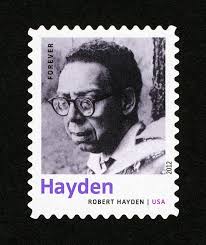 Robert Hayden, another English professor, wound up on a U.S. postage stamp. At his office, I showed him my latest poems but he didn’t cotton to jokey, light fare. He was polite, though. He dressed properly, just like my Great Books prof. Profs dressed either like profs or hippies. There was no in-between.
Robert Hayden, another English professor, wound up on a U.S. postage stamp. At his office, I showed him my latest poems but he didn’t cotton to jokey, light fare. He was polite, though. He dressed properly, just like my Great Books prof. Profs dressed either like profs or hippies. There was no in-between.
August 14, 2024 3 Comments
THE MUSICAL INFLUENCES
IN MY LIFE
From the Cleveland Plain Dealer (7/24/24) . . .
The musical influences in my life
by Bert Stratton
CLEVELAND HEIGHTS, Ohio — I played music with a prodigy. I didn’t know he was a prodigy. He and I were in junior high. He played piano. I played clarinet. I just googled him — William Goldenberg. He wound up at Oberlin College, Julliard, and then Indiana University. He became a professor of piano at a university. I didn’t know him that well; he was the son of a friend of my parents.
I wasn’t in the prodigy’s league. Not even close. But I did practice a lot. I enjoyed the “typing” aspect of clarinet — learning where to place my fingers on the instrument. I blame my parents and my clarinet teacher for much of my musical shortcomings. Leonard Bernstein was not on the TV at our home. There was no “Peter and the Wolf” by Prokofiev. Harry Golub, my clarinet teacher, was an alumnus of the Ohio State University concert band and owned a music store in South Euclid. He sold guitars, bongos and band instruments.
I entered The Contest every year in junior high. The Contest — as we kids called it — was a music-recital competition sponsored by the state music-educators’ association. Young musicians would play their repertoire in front of teacher-judges, who would give us ratings of I, II or III.
I often got III — the worst. I would get nervous and lose my place in the sheet music. Worse, I didn’t know how the piece was supposed to sound because I had never heard a professional recording of it. I especially remember a train wreck on Mozart’s “Divertimento in D Major, Minuetto,” at a contest held at Moody Junior High School in Bedford around 1963. I lost my place several times and had to start over from the beginning. My prodigy accompanist was of no help.
Classical musicians tell you, “I studied with Joe So-and-So, who studied with Marie So-and-So, who studied with Maestro So-and-So.” It’s biblical – the lineage obsession in classical music.

Philip Setzer
My pianist developed a long, impressive bio over the years, but not as long as another guy — from my Little League — who intimidated me even more. He was Philip Setzer, a violinist I went to grade school with. At holiday school concerts at Victory Park School in South Euclid, I’d botch “The Theme from Exodus,” and Setzer would ace-play a Brahms sonata. Phil was a founder of the world-renowned Emerson String Quartet, which, until its members’ recent retirement, was like the New York Yankees of string quartets. Setzer’s mother and father were violinists in the Cleveland Orchestra; he attended many Cleveland Orchestra concerts as a kid. That helped.
In the early 1990s, I played a benefit concert with two Cleveland Orchestra musicians. It was a fundraiser for a Jewish day school. The orchestra musicians asked me whom I had studied with. I said, “Nobody.”
Mr. Nobody: Harry Golub. His store was on Warrensville Center Road at East Antisdale Road. The structure now houses South Euclid Hardware. The building — in the 1960s — also featured a hair salon and a kosher butcher shop, run by Mr. Golub’s father.
Harry Golub often ate Hebrew National salami sandwiches during my lessons. That stunk. He was into real estate. He built a four-suite apartment building across the street from the music store. So he owned two buildings: the music building and the apartment building. He named the apartment building after his daughter, Joyce. Mr. Golub, by his example, taught me about real estate and very little about music. Maybe that’s why my parents sent me there for lessons.
Bert Stratton, a frequent contributor, lives in Cleveland Heights and has also written for The Wall Street Journal and New York Times. He writes the blog “Klezmer Guy: Real Music & Real Estate.”
August 6, 2024 5 Comments
GOING FULL-ESPAÑOL
When I traveled in Latin America in the early 1970s, I was constantly on the lookout for American culture. American culture, not Latin American culture. I was homesick. In Mexico City I heard Kurt Vonnegut give a lecture. I went to American movies. I remember Paper Moon. I attended a Charlie Byrd concert in Bogota. Bryd — a jazz guitarist — had played with Stan Getz. Byrd introduced his band in Spanish, saying “en la batería” for “on the drums” and “en el bajo“ for “on the bass.” Byrd connected linguistically and I admired that. His concert was part of a U.S. State Department tour.
I did an Charlie Byrd imitation last week. I introduced Vulfpeck in Spanish at a concert in Madrid. I spoke Spanish to 3,500 Spaniards!
https://www.youtube.com/watch?v=8P-e3bGDSak

Outdoor concert, Vulfpeck, Madrid, 7/21/24.
I told my son Jack that my intro would take a minute. It took 4:19 minutes. While I blabbed on, Jack became slightly agitated stage-left, in the wings. He signaled me to speed it up but I didn’t see him.
I hate it when a musician says he’ll do a minute and then solos for two minutes. In my defense, re Madrid, some of my stage-hogging time consisted of applause and laughter.
Here’s a translated joke from my intro: “Ladies and gentlemen, I was so excited when I first heard Vulfpeck was going to play Madrid that I immediately went on the internet and checked out the lineup for tonight’s show — Apertura de puertas 7:30 pm, Judith Hill 8:45 pm, Vulfpeck 10:15 pm. I wondered, What is this band Apertura de Puertas?”
“Apertura de puertas” means “Doors open.”
Maybe you had to be there.
—
I had a terrific Spanish teacher, Judith Worth, at Brush High. She wrote me in 1980: “Bert, I was glad to have news of all your classmates, and to know that they are doing well — and have used their Spanish. I was very attached to all of you, as if you were my own kids.” I’ll send her this post. (According to the internet, she’s 87 and living near Austin. I last talked to Mrs. Worth four years ago.)

Charles F. Brush High yearbook, 1968.
July 31, 2024 3 Comments
REFRIGERATORS ARE FUN
The Hotpoint refrigerator — the “value” brand of G.E. — is a good product. It lasts 20 years.
That’s what you want: 15-to-20 years.
And if we start talking stoves, you want even longer. I got 24 years out of a Magic Chef stove. The burners were clogged and the thermostat was shot. Time to buy another one.
I used to buy Spanish refrigerators. Welbilt. The spelling said it all. Good for only nine years. Frigidaire isn’t much better — 10 years.
I buy appliances from a distributor out of Stow, Ohio. He’ll hook up the gas flexline (pigtail) to the stove. I could go to Bernie Marcus at Home Depot, but my guy in Stow is hassle-free and about the same price.
Refrigerators are fun; they don’t often screw up, and you can occasionally get a few beers and pops after the tenant moves out. Definitely some open ketchup.

I didn’t take anything from this refrigerator.
July 24, 2024 1 Comment
IF YOU’RE LOUD, YOU’RE LOVED
When Trombone Shorty played last month at Cain Park, in Cleveland Heights, he was loud. I didn’t take out a decibel reader but the show was ear-splitting. And I was wearing earplugs. Trombone Shorty frenetically ran around saying, “Let’s get crazy!” and “How you feeling? Feeling Good!” He played mostly super-loud funk and not much New Orleans brass-band music.

Trombone Shorty
Why did I go? Because I like the name “Trombone Shorty.” If Shorty had been Joe Smith, I probably wouldn’t have gone. [What’s Shorty’s real name? . . . Troy Andrews.] I like New Orleans brass-band jazz. I don’t like rock-level blasting. Two guitars, electric bass, loud drums, no sousaphone.
Eleven years ago I was in New Orleans on vacation, and I sat in with some pro musicians on Jackson Square. Trumpeter Kenny Terry had a slick ensemble which entertained tourists on the square. I went back to my hotel room, got my axe, and — heads-up, Kenny — here I am!
Terry said, “Where you from — Kansas?” Close enough. He announced to the crowd: “Ladies and gentlemen, we have a special guest from Cleveland!”
Cleveland was good business for Terry; eyeballs focused on the white guy with the clarinet. Tip-jar activity increased. There were about 100 people.
We did a Bb blues. I didn’t project enough; I had a thin sound, at least for outdoors. Kenny said, “You got to play with some balls!” That hurt.
I said, “I have this cheap plastic reed!”
The word in New Orleans is “If you’re loud, you’re loved.” (Phil Frazier, of Rebirth, said that.)
Back home in Cleveland, I bought a new, louder clarinet barrel so I could played with “some balls.” Trombone Shorty, at Cain Park, played with a lot of balls. He should have stuck with two.
—
I’ve disliked loud music for a long time — way before I became an old crank. My freshman roommate at college was into the MC5. I convinced him to move out of our room. Then I got a roommate who liked Jefferson Airplane. That didn’t work out well, either. Pure jazz — that was my thing. The blues, too. My third — and final — roommate was into nothing musically, and we got along fine.
So I had three roommates my freshman year. Does that say anything about me? Nothing! (Screeched at a high decibel.)
July 17, 2024 5 Comments
A BAD THING
I was in for 46 days — 30 at county and 16 in Grafton. Handcuff this, handcuff that. My wife said I did some bad stuff. She told the judge I did 100 bad things. I did a bad thing, and I apologized. I told my wife I had an affair three years ago, and she wasn’t cool with that. If I hadn’t told her, she never would have known. She said there would be consequences. There were. She divorced me.

And she told the judge I was coming on to her like ISIS for years. I admitted to a bad thing.
I’m not going out to bars or drinking anymore. Too many bad things happen when I do that. I’m just going to my job and the gym now. That’s it. I’m on five years’ probation.
(fiction)
July 10, 2024 1 Comment
A WRITER’S GUIDE (1974)
I’m back in Cleveland. I’m thinking about Boston and New York. I know you are, too.
Here’s the title of my next book: Horseman Jake Rides the Syrup.
Nostalgia is a drag. Jack Kerouac is an inspiration. How about reading My Friend Henry Miller by Alfred Perles?
The dinosaur was the most successful specie that ever lived.
I left my heart in Sandusky.
My friend Chap owns a Corvette. He rendezvoused with 11 other Corvette owners at Eastgate. He’s got a 350 hp with headers, minus emission controls.
I saw Sleeper. I resented the nebbish-Jewish stereotypes.
Dad: “If you get a car, what are you going to do to support it?” Me: “I’ll get some money somewhere. I’ll rob a bank.” Dad: “You do that and I’ll wipe my hands of you — finished!”
Anybody who talks Lit in this town is talking $.
Stan Smith vs. John Newcombe.
Nelson Algren’s tough-guy first-person stories are obnoxious. Bukowski can pull it off because he really is a fuck-up.
To Martha Winston at the Curtis Brown Agency: “This is my latest novel. I’d appreciate it if you’d take a look at it. The book is mostly about a junior-high-school boy. I haven’t sent this manuscript to anybody else.”
Terry Southern, Erje Ayden, Buk, Dreiser and McMurtry ought to form a horny men’s club. I’d join.
Never write about a place you haven’t done time in — at least a year.
Here’s a simile. Not sure where it’s from: He looked like a chalkboard eraser floating in a pool of beer.
High school is something I’m trying to forget — not remember!
I dig Bob Newhart because his humor is so low-key, and he’s so shy. Richard Price said, “I used to think writing was like being a stand-up comedian.”
Anthony Burgess doesn’t crack a joke in the first 60 pages of his novel M/F.
Detail for detail’s sake is useless.
My dad said I should apologize to my friend Dennis for calling him a “swine” on the phone.
Horse sit.
Anwar Sadat. Answer Sadat.
Erza, from the Bible, lived in Babylonia.
I’m buying my dad’s Plymouth Valiant, and he’s buying a new Dodge Dart Swinger. I’ll need plates, a title, and insurance.
Dad says, “You don’t know what rough times are.” He knows. His mother wouldn’t allow him to go out for track in high school because he had to work in the store after school.
Authors have two jobs: writing stuff and learning stuff. You need to know something. What do I know?
Music is easier than Lit. In music — at least instrumental music — you can play scales all day if you’re uninspired. In Lit you can pick your nose and flip out.
Zawinul. Hank Crawford. Adderley. The Nude Wave is on Impulse.

Bert Stratton, U-M Hopwood photo, 1974.
Characters in novels go to Chapel Hill (Thomas Wolfe), Harvard (Wolfe again), U. of Chicago (Roth), or Columbia (Kerouac). Where is the great A2 novel?
Blue and maize will make a purple Hayes.
Tickle University, Philadelphia, Pa.
This Book Closes at 10 pm.
The Bar Mitzvah Goer by Walker Pearl.
Never again — Meir Kahane.
I’m thinking of getting married. To whom? You!
The Time-Life building is right here. I’m living in it — the Mark IV apartments, Beachwood, Ohio. (So are my parents.)
July 3, 2024 4 Comments
MY SON THE TRAVEL CONCIERGE
My son Ted specializes in extracting parents and relatives from travel crises. He never gets lost. He always knows where he is. Ted has been like that since he was age 9, when he rode the Lee Road bus for the fun of it.
Ted, Alice, and I recently got delayed at LaGuardia Airport. Delayed big-time. Our flight was canceled. It was canceled just as I pointed out to Alice, “This weekend has been seamless.” We had traveled to a family wedding a couple hours north of NYC. When our LaGuardia flight was canceled, Ted immediately got on Priceline and booked us a hotel at a nearby dump in Queens. But a nice dump.
New York’s outer boroughs — I like them, in theory. But when I go to NYC, I rarely leave Manhattan. How often do I ride the bus in Queens? Just this once. With Ted’s assistance, we caught a city bus outside our hotel and went to Flushing and wound up at a noodle house. I hocked the Chinese-American guy next to me in the restaurant. He said Chinatown in Manhattan is bigger than the Chinatown in Flushing. But Flushing’s Chinatown felt bigger to me. Flushing was like a total-immersion Asian experience. (Manhattan’s Chinatown is more like a neighborhood touristy thing, next to another colorful neighborhood, Little Italy.)

Ted [pink shirt], England, 2016 bike tour.
Koffi, an African clerk at the Delta Airlines counter, said to me, “Your son is in charge now. He has a good demeanor.”
Right. Glad.
June 26, 2024 1 Comment
THE ONE AND ONLY
ROLAND HANNA
I talk a lot at nursing-home gigs. I like to get the audience talking, too. I ask the audience about their favorite delis and where they went to high school. One guy always heckles me – “Again with the high schools?” Yes, again with the high schools. And this guy is not even a resident; he visits a friend who lives in the nursing home.
I often ask listeners their names. At my last gig, there was a woman, Ona, who said she was named for the actress Ona Munson. Never heard of Ona Munson. I didn’t ask Ona where she went to high school because she’s from New Jersey and nobody in Cleveland knows about New Jersey high schools.
An elderly husky black man had some musical requests. He was a visitor. He wanted “One O’Clock Jump.” I didn’t know it. Then he said, “Anything by Glenn Miller?” I played “I Got Rhythm.” Close enough. He rocked-and-rolled to every song – clapping and singing along. Alan Douglass (my piano accompanist) and I played all kinds of music: klezmer, American pop, Israeli. The man grooved to everything. He said his name was Roland Hanna.
“Roland Hanna! I guess Alan and I better go home now,” I said. Alan and I would leave and let Roland take over. Roland smiled. Roland Hanna, the renowned pianist. Roland told us to continue.

Roland Hanna
Alan asked Roland if he liked “sweet soul,” a favorite genre of Alan’s. Roland was cool with that. Alan did “Stone in Love With You” by the Stylistics. Roland knew every word. Then Roland requested Billy Joel. It’s affecting when black musicians request songs by white artists. Roland said, “You can do Billy Joel! You’ve got a harmonica player.” I did have a harp. We played “Piano Man,” featuring harp.
Alan did a country tune, “Behind Closed Doors” by Charlie Rich, and we did the soul tune “My Girl,” and Alan did a funk tune, “Will It Go Round in Circles.” All for Roland Hanna.
Before the final tune of the set, I asked Roland if he wanted to play something with us. He passed. After the gig, we schmoozed. I asked if he still played. He said he had never played. He said he was Rollin Hannah, Cleveland Heights High class of ’69. He said, “It’s Rollin like in Sonny Rollins, and Hannah, spelled the same backwards and forward.”
—
Pianist Roland Hanna was a Detroit musician who played in the Thad Jones –Mel Lewis Big Band in New York in the 1970s. “Roland Hanna” — the name — stuck with me all these years. Stuck a bit too hard.
June 19, 2024 1 Comment
IT’S NOT ABOUT THE RACKET
From today’s Cleveland Plain Dealer . . .
It’s not about the racket
by Bert Stratton
CLEVELAND HEIGHTS, Ohio — When I trounced my friend Jimmy in tennis, he blamed it on his racket. His racket — his good racket — was in the shop for restringing. Jimmy said he was hitting the ball longer than usual with his back-up racket, and he didn’t have his usual deft touch on drop shots. I was surprised by the kvetching; Jimmy is usually stoical about his game and has never been an equipment freak.
Lance Armstrong said it best: “It’s not about the bike.” Or, it’s not about the racket. For example, I have a childhood friend who is a tennis pro in Israel, and he occasionally comes back to Cleveland to visit relatives and beat me in tennis. My friend, Shelly Gordon, doesn’t even bring a racket with him from Israel; he borrows one of mine. Shelly and I grew up playing tennis on the public courts at Bexley Park in South Euclid. The dress code then, in the 1960s, was Bermuda shorts, Jack Purcell tennis shoes and T-shirt (optional). Shelly never took private tennis lessons; nevertheless, he made the Ohio State University tennis team.
I took about 10 private lessons at the Cleveland Skating Club in Shaker Heights. My dad paid a nonmembers’ rate for the lessons. The club pro called me “Tiger.” I think he called all nonmembers “Tiger” because he didn’t want to learn their names.
At a recent high school reunion, a former Brush High tennis player was still mad at me — and envious of me for my private lessons. Hotshot players like him, from all over the East Side, would schlep down to Cain Park in Cleveland Heights, where the best public-court players hung out. There was a Cleveland Heights High player, Rich Greenberg, who was so into tennis he would shovel snow off the courts in the winter. He eventually played for the University of California at Santa Barbara.

Bert Stratton, age 16, 1967, Brush High courts
Rich taught me an important life lesson: how to wait. Every winter, I had to wait six months for good weather to come around again, so I could play tennis. I wasn’t going to shovel courts. Think about it: No snow blowers in the 1960s, and the courts had to be perfectly dry. And right after you shoveled, it would snow again. (And we didn’t have access to indoor courts.)
When I played my friend Kvetchin’ Jimmy — the man with the bad racket — he muttered unintelligible things to himself and fiddled with his strings. I beat him 6-2, 6-2. He usually beats me. Funny, I, too, had a handicap. But did I complain? No, I didn’t. My left hand (my dominant hand) tingled from having played a steel-string acoustic guitar the night before. I didn’t mention that to Jimmy. Probably because I won.
In tennis, it’s all on you. There’s usually nobody else to blame. Here’s a useful rule: If you lose, blame the wind. That’s less offensive than blaming your racket.
—
Yiddishe Cup performs 2-3 pm this Sun. (June 16). Father’s Day. Free. Beachwood Branch, Cuyahoga County Library, 25501 Shaker Blvd. (corner of Shaker Boulevard and Richmond Road). Indoors.
June 12, 2024 3 Comments
GERSHY AND TOBY

Toby Stratton (1917-1986). Photo 1984.
My father, Toby, took me to a lightning-round tutorial with Cousin Gershy. (Gershy is short for Gershon.) Gershy looked horrible — three strokes and two heart attacks. My dad didn’t look any better. My dad died of leukemia two months later.
Gershy had shotguns, a steer horn and a shalom plaque over the mantle. Gershy said, “You wouldn’t believe it, but I used to be a shtarker (strong guy/bully). Now I’ve got this little curl in the tail — that little something different — that something the new treatment doesn’t cure. You’re in trouble, they say. They say, ‘We can’t straighten out your tail. You’re dead.’ That’s what the doctors tell me.”
My dad didn’t chime in. (The docs guessed my dad had another two years.)
A gun dealer had sold Gershy the steer horn for $50, and now the gun dealer wanted the steer horn back. “Gun dealers is a funny ballpark,” Gershy said. “He could shoot me, but a deal is a deal. That’s the way it is.”
Gershy owned a shopping strip center on Mayfield Road in Cleveland Heights. (The building had Gable Pharmacy and Bass Lock & Key.)
Gershy’s price was too high, Toby said.
“If the kid is interested,” Gershy said, looking at me. “I’d come down.”
“It’s up to the kid,” Toby said.
“I’ll work with him,” Gershy said.
On the drive home from Gershy’s, Toby said to me, “Gershy has mellowed.”
Mellowed? Gershy did not seem mellow to me — not part of the Donovan, mellow-yellow ethos.
“And he’s a gonif,” Toby said. “Don’t buy anything from him.”
I didn’t. Instead I bought an apartment building in Lakewood a year later. I bought the Lakewood building because I wanted to prove to myself I could pull the trigger — buy a piece of investment property — without my dad telling me what to do. My dad was dead. I was 36. I bought the apartment building from a man named Chisling. Odd name, right? I could have used some advice from my dad.
—
Yiddishe Cup is part of the Shavuot celebration 7:15-8 pm Tues. (June 11), Park Synagogue, Pepper Pipes, Ohio. We’re doing a 45-minute concert. For more info, click here.
June 5, 2024 1 Comment
BIKING BACK
I live two miles from where I was born. Every 60 years or so, I bike back to Kinsman – the area my parents lived pre-1951. St. Luke’s Hospital — where I was born — abuts Kinsman. Kinsman used to be a mix of Italians, Jews and Slovaks.
The first time I left home on my own steam was when I biked to Cermak Drug at East 93rd Street and Union Avenue. This was about 1962. I went with Cermak himself — the son of Cermak, actually. The Cermak family lived across the street from us in South Euclid. John Cermak (around age 12 at the time) and I used red city map books to navigate to the city. What were those books called? Street Atlases. Cermak and I made it to the drugstore and back.
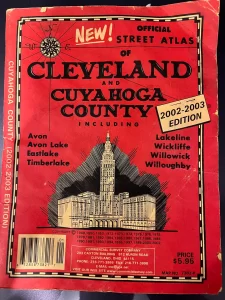 Last fall I biked to a different Kinsman drugstore to get a Covid booster. I couldn’t get it in my neighborhood, so I found a CVS at East 108th Street and Kinsman Road. I mapped out my route. It was like I was going to a foreign land. I biked by Benedictine High and boarded-up Audubon School and Woodland Hills Park, which is now Luke Easter Park. (Easter was a Cleveland Indians player.) The pharmacist at CVS said, “You’re the third person today who said he came from Shaker or the Heights.”
Last fall I biked to a different Kinsman drugstore to get a Covid booster. I couldn’t get it in my neighborhood, so I found a CVS at East 108th Street and Kinsman Road. I mapped out my route. It was like I was going to a foreign land. I biked by Benedictine High and boarded-up Audubon School and Woodland Hills Park, which is now Luke Easter Park. (Easter was a Cleveland Indians player.) The pharmacist at CVS said, “You’re the third person today who said he came from Shaker or the Heights.”
I’ve been through Kinsman many times in a car, but my recent bike thing was the most memorable excursion. I doubt I’ll bike through Kinsman again. I’ll go to Europe.
May 29, 2024 3 Comments
WHAT SMELLS?
Last week Ms. Seif, a tenant, claimed she needed to move out because she’s allergic to the smell of Indian food, which was coming from the restaurant below her apartment. She is on the second floor, above the restaurant. Her text to me read: “I am allergic to the Indian restaurant spices. I keep smell it everywhere especially in the toilet.” She also said she went to her doctor, “and he asked me if I can leave my apartment.”
She phoned me:,“I’ve been stuck in bed for a month. It smells in the toilet.” She’s a foreigner and her English is a bit peculiar.
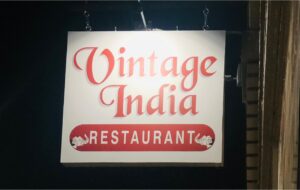 I said, “There are a billion Indians in India and they’re not allergic. One-eighth of the world! You were aware there was a restaurant when you moved in. We have a good venting system here.”
I said, “There are a billion Indians in India and they’re not allergic. One-eighth of the world! You were aware there was a restaurant when you moved in. We have a good venting system here.”
Ms. Seif has been a tenant for only three months, and she has been late with her rent twice, and she tried to install a bidet herself and ruined the coupling, so the toilet leaked into the Indian restaurant.
Four years ago, when the Indian restaurant opened, I was concerned about possible odors coming from the restaurant. That’s why we have a good exhaust fan. Nobody else has complained so far. Just her.
How can you be allergic to a smell? Don’t you have to eat something to be allergic to something? Or at least have particles in the air, like hay fever. Strange: Indian spices make you sneeze and put you in bed for a month.
Ms. Seif is 27. I’m probably going to let her out of her lease, but she definitely is not getting her security deposit back, and I’ll try to get an extra month’s rent from her. She’s got nine months to go on her lease!
. . . A relative of hers just called. He said she is recently divorced and has a kid, and he feels sorry for her.
I just stopped by her apartment. She seems friendly enough. I said, “Ms. Seif, to change the subject, you sound like you have a Spanish accent but have an Arabic name.” I was hoping she was Lebanese from South America, so I could practice Spanish with her. She’s Egyptian.
. . . She moved. She left the place “pristine,” says the on-site building manager. She left the bidet. Our new rental ad will read “toilet has bidet attachment.” Maybe that’ll help rent the apartment.
I didn’t get the extra month’s rent.
What smells?
—
Seif is a pseudonym.
May 22, 2024 1 Comment



